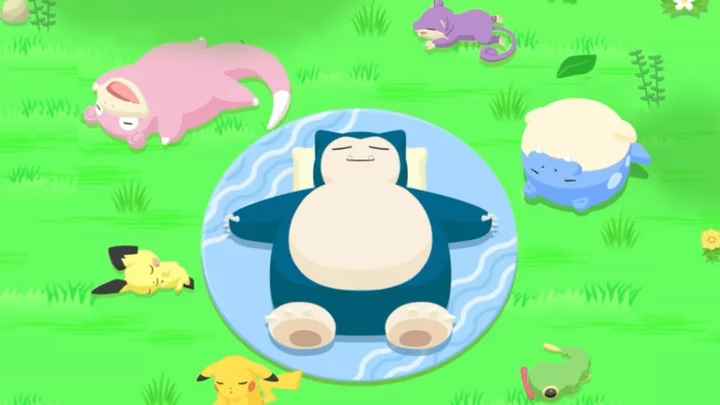
11 glorious ways to bring green into your home
Incorporating nature’s favourite shade, green furnishings feel fresh and represent a blooming of the biophilic aesthetic. Indeed, boosting your outlook by incorporating plants – we’re not just talking living greenery – can be bright and beneficial. Think flora in the shape of wallcoverings and bedding, upping your five-a-day with stylish cookware and sitting on rich velvets to suit your setting. From leafy shades to palm prints, these green gems will elevate your space… 1. Daydreamin’ Climate Change Scented Candle, £24.50 (was £35), Daydreamin’ A candle with benefits… when you want to back, this green woody scent evokes Mediterranean cypress trees, moss and earthy aromas – with five trees planted for every candle sold. 2. George Green Riverside 5-Piece Pan Set, £43 (was £65), Direct.asda These trendy sage-green aluminium pots and pans can easily be stacked and stashed away, after your verdant veggie menu has been served and savoured. 3. Russell Hobbs 17 Litre Scandi Green Digital Microwave with Wood Effect, £94.99, Russell Hobbs Blending function with flair, this Scandi-style 700-watt microwave features eight pre-set cooking menus for a host of dishes, from pizza to seafood. 4. Set of 4 Avocado Nesting Bowls, £28, Rockett St George Our favourite superfood loves happy-hour snacks just as much as brekkie time. 5. Hollis Glassware Collection: Set of 4 Wine Glasses, £28, Next Tailormade for ‘green’ wines such as sauvignon blanc, these ribbed wine glasses will up your topiary-themed tablescape. 6. Serena Dark Green Velvet Bar Stools, £199 each, Danetti Whether you’re entertaining in a dream kitchen or bijou galley, these plush velvet bar stools with quilted chevron detail will style up your space. 7. Balcony Self-Watering Planters: From left, £75; £100; £150, LSA International For low-maintenance windowsill décor, these planters will allow you to head off on holiday without the worry of how your greenery will last without being watered. Suitable for plants, bulbs and herbs, the cotton trailing cord leads water to the roots for steady moisture in the soil. Genius. 8. Serendipity Greenhouse Bespoke Mural, Green, £42 per square metre, Graham & Brown When you really want to go for it and create a wonder wall with giant grasses and fabulous foliage, your botanical garden can fit into the smallest of schemes – simply enter the width and height of your walls to customise your greenery. 9. Botanicals Ferndale Fabric Love Chair, £399.99 (was £549), SCS This sumptuous accent chair sets the scene for armchair travelling with thoughts of tropical rain forests and jungle-themed holidays. 10. Bobbi Beck Flora Vintage Tropical Wallpaper, White, £75 per roll, Bobbi Beck Another way to imbibe a tropical paradise, this flora wallpaper is showstopping enough to be framed – so you don’t have to limit yourself to a feature wall. With clever use of mirrors, this bold design ensures your love of living things is planted firmly in your home. 11. Moorland Flora Black Duvet Cover and Pillowcase Set, from £24 (double), to £32 (super kingsize), Dunelm When it comes to rewilding your bedroom, these beautiful wild flowers set against a black background, with contrasting red piping, will make every bed the ‘best in show.’ Part of Dunelm’s Natural History Museum collection, the cotton/poly blend offers comfort and style. Read More Charity boss speaks out over ‘traumatic’ encounter with royal aide Ukraine war’s heaviest fight rages in east - follow live What can you actually do to help prevent cancer, as 12% believe coffee is carcinogenic? A-Level results: How to be the emotional support your teen really needs These are the cheapest school uniforms on the high street – according to Which?
2023-08-17 17:51

Half of anxiety and depression cases in new and expectant mums are missed: 7 signs a new mum needs help
Half of all anxiety and depression cases among new and expectant mothers are going undiagnosed, according to a new report. Although 10-20% of women develop mental health problems, which can include anxiety and depression, during pregnancy or within the first year after having a baby, 50% of cases are being missed – despite contact with professionals, the report by the Royal College of Midwives (RCM) found. The report suggested that mental health needs are still secondary to physical health during pregnancy, and has called for a boost in midwife numbers to help spot more cases of mental ill health. Amanda Mansfield, professional advisor to the RCM and one of the lead authors of the report, said the 20% of new or expectant mothers who have mental health issues will experience a range of symptoms. “Often the ‘baby blues’ is normalised because it’s something lots of people get, and women are told, ‘You’ll be fine’,” Mansfield told PA Media. “That can contribute to the fact that significant numbers of women downplay their symptoms – in some reports, up to 70% of women don’t feel able to disclose how they feel, they may feel judged. “Some women feel it may affect their ability to mother, or they may be concerned their baby may be taken away.” Mansfield added that some women may feel unable to share their symptoms with a health professional, because they’re worried about how they’re going to be perceived. “But it really is ok to not be ok, rather than women playing down and diluting their feelings,” she added. It’s a good idea for everyone to be aware of mental health risks during pregnancy and beyond. Here are seven signs that somebody might need mental health support, and how to talk about it… 1. DepressionPregnant women or new mums may feel low, unhappy and tearful for much or all of the time. Mansfield said: “It’s looking for the variation in normal patterns of behaviour. Family and friends should ask, in a very compassionate, non-judgmental way, how the woman’s feeling.” If friends and family don’t feel confident about having such conversations, they should encourage the woman to talk to her health professional, Mansfield added. 2. Anxiety Feelings of anxiety can manifest in many ways, and physical symptoms can include a racing pulse, breathlessness and sweating. But whether there are physical symptoms or not, it’s vital for women to talk about how they’re feeling, said Mansfield. “A woman may say she feels particularly anxious about the birth, or relatives coming over, or the in-laws, and having the space to talk about it is really important, to share the anxiety with a midwife that she has a relationship with.” If these anxious feelings don’t improve over time, Mansfield said they can be referred to a specialist midwife who’s an expert in perinatal mental health, and who may be able to offer additional interventions and support. 3. Altered sleep patterns All new parents will of course find their sleep is affected, but if there is also an underlying mental health issue going on, exhausted women may find it even hard to fall or stay asleep. “Women may have significantly disrupted sleep patterns, but we often normalise that with later pregnancy and new parents having difficulty sleeping,” Mansfield pointed out. “It’s really important that if you’re having problems sleeping, and you may be unable to settle and find your mood is a lot lower, you talk to your health professional about that.” 4. Appetite changes “Some people do find their appetite is affected,” said Mansfield. This may mean women lose their appetite and forget to eat or, conversely, comfort eat and possibly put weight on. 5. Difficulty concentrating It’s common for women to describe having ‘brain fog’ when they’re pregnant or have just had a baby, but sometimes an inability to concentrate can be a sign of a deeper problem. Mansfield explained: “A woman’s ability to concentrate can be markedly affected, and we often downplay that – it can be a subtlety that we ally with having a baby or being pregnant, but these can be really important signs and symptoms to share with your health professional, as they may suggest there’s something that needs exploring further.” 6. Obsessive compulsive behaviour Starting to behave obsessively or compulsively, or symptoms of any pre-existing obsessive compulsive disorder (OCD) getting worse, can be linked to perinatal mental ill health too. “Some women may be excessively tidying, for example, or be fixated on something and they may become more anxious,” said Mansfield. “Very commonly, obsessive compulsive disorder may become worsened. Certainly if someone does have compulsive disorders, it’s important not to put them to one side, but share them with your midwife. Picking it up early is so important.” 7. Unusual thoughts Of course, new parents will have lots of new things to think about – but when those thoughts are perhaps a little unusual, it’s worth talking to family, friends and your midwife or health visitor about them. Mansfield said: “Women may present with different thoughts they haven’t experienced before, and often they downplay that because they’re not sure whether they’re normal or not, or they might think they’re just part of being pregnant and having a baby. “The challenge for us as midwives is when you only have 15/20 minutes antenatally to do the whole health assessment – the physical and mental health assessment. It’s about understanding the subtlety of behaviour change.” Read More Charity boss speaks out over ‘traumatic’ encounter with royal aide Ukraine war’s heaviest fight rages in east - follow live This Morning’s Dr Zoe Williams: Why gut health could be more important than you think this summer Vitamin D intake ‘may reduce cancer mortality in the population by 15%’ – study Men who cycle, jog or swim could cut risk of nine cancers – study
2023-08-16 21:54

12 Fascinating Facts About Pallas’s Cats
The elusive, fluffy wildcat may be adorable, but they’re not social animals. They don’t even seem to like each other very much.
2023-08-16 01:19

16 inspiring 'Game of Thrones' quotes to live by
Regardless of how you feel about the ending of Game of Thrones, it was the
2023-08-15 10:25

4 Note-Taking Tips That Can Change Your Life
When I was a kid, I desperately wanted to become a writer. I hung around
2023-08-14 23:19

12 facts about space that will rock your world
When you look up at the stars, what do you think about? That we may
2023-08-14 15:56

How to Use Google Bard AI: 10 Ways It Can Make Your Life Easier
In the battle of the AI chatbots, Google Bard hasn't yet caught on the way
2023-08-14 02:27

5 ways to help victims of the Maui wildfires
Wildfires have devastated the Hawaiian island of Maui. With a current death toll of 93,
2023-08-14 01:21

13 Fascinating Facts About Grapes
Wine grapes and table grapes are a huge agricultural asset. It's no wonder that the humble grape is among the world's largest fruit crops.
2023-08-12 06:29

Pokémon Sleep Recipe List: Curries, Salads, Drinks, Desserts
Having trouble figuring out all recipes in Pokémon Sleep? Then this article is for you.
2023-08-12 03:28

14 podcasts to teach kids about history, identity, and current events
As your child heads back to school, you may be looking for appropriate ways to
2023-08-11 17:48

7 ways for parents and carers to ease back-to-school worries
School should be the best years of children’s lives – but, as the new term approaches, evidence suggests it’s actually the most worrying time for many kids. The children’s helpline Childline delivered 7,772 counselling sessions about school/education worries last year, with a big increase in calls in the run-up to the start of the new school year. “School is a huge part of a child’s life, so it’s important they feel happy and secure there,” says Childline director Shaun Friel. “We know some children can feel anxious and apprehensive about going back to school, particularly after spending a lot of time away from the classroom due to the summer break. “In fact, our Childline counsellors see a spike in the number of counselling sessions they deliver to children about school worries following the summer holiday season.” Friel says some children feel worried about making friends, getting lost, or the workload at a new school, while others may have concerns about returning to their current school due to friendship issues, fears about upcoming exams, or the recurrence of bullying. “However a child feels about returning to school, we want to remind them that these worries are normal and they aren’t alone,” he stresses. “If any child is feeling apprehensive about going back to school, our trained counsellors are here 24/7 over the phone and online.” As well as counselling, Friel says there are many things both parents and children can do to ease back-to-school anxieties. They include… 1. Writing feelings down Parents can get their child to write down everything they’re looking forward to at school, and everything they’re worried about. “Encourage them to show you the list so you can chat through their concerns, help them cope with their worries and also look at the positives,” suggests Friel. 2. Listening to their concerns If your child has concerns about going back to school, take time to listen to what they’re saying before you jump in to give advice or your opinion, Friel advises: “You could try repeating back what they’ve shared to check you’ve understood their feelings correctly – this will help them to feel really heard.” 3. Discussing practical solutions Once your child has shared any concerns or anxieties about going back to school, you could try talking through some practical solutions, suggest Friel. So, for example, if they’re worried about the amount of homework they’ll have, you could discuss how to break this down each evening and what they could do if they start to feel overwhelmed, like talking to their teacher or you. “You could start by asking them what they think might help them feel better about the situations that worry them,” says Friel. “This can encourage them to learn to think for themselves and feel in more control of the situation.” 4. Reminding them to take their time Remind your child it can take time to adjust to being back at school, and it’s okay if it doesn’t feel comfortable at first, says Friel. “Being back at school will mean a totally different routine, and it’s important to remember that this can take some getting used to,” he stresses. 5. Doing things they enjoy When kids are back at school, making time every day to do something they enjoy can really help to ease anxiety, says Friel. “Whether it’s time in their evening with friends, reading a book or hanging out with their siblings, it’s important to take time out,” he advises. 6. Talking to a trusted adult It’s important children are aware they can and should talk to a safe adult – perhaps a parent, carer, teacher, sibling over the age of 18 or a Childline counsellor – about anything. “No matter what the reason, if a young person is struggling ahead of going back to school, it’s vital they’re encouraged to talk to a safe adult about it,” stresses Friel. “Sharing their feelings with someone they trust will help them feel less alone with their worries, and that adult will be able to support them with this moving forward.” 7. Distracting themselves If children or young people make an effort to keep busy doing something they enjoy, such as playing football or listening to music, this could distract them from their worries, at least for a little while, says Friel. Staying connected with friends and family, whether that be online or in person, or doing some physical activity like going for a walk or taking part in a sport, can also be a good distraction technique. Young people can contact Childline, which is run by the NSPCC and supported by the People’s Postcode Lottery, on 0800 1111 or via 1-2-1 chat on Childline.org.uk Read More How to save money on your summer barbecue – as prices jump up from last year How to pick the best facial according to your age range What is the ‘carnivore diet’ trend and is it actually good for you?
2023-08-11 17:27
